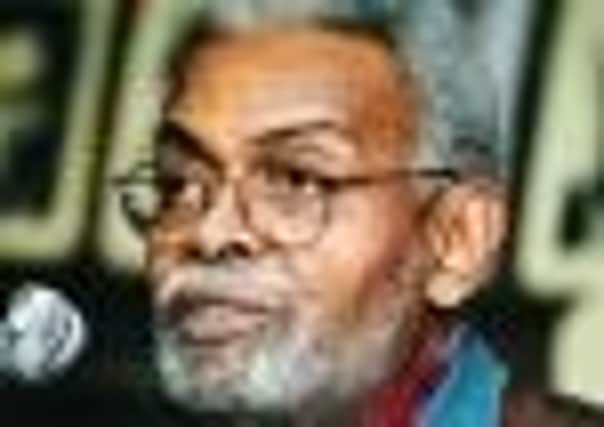Poet and activist speaking his mind


TO say that Amiri Baraka has led a colourful life would be an understatement.
A leading African American poet, writer, lecturer and activist, his controversial career spans more than five decades, going from Greewnich Village Beat poet to Harlem agitator who has influenced a generation of young black writers.
Advertisement
Hide AdAdvertisement
Hide AdBaraka, who turns 78 this weekend, is appearing at the Ilkley Literature Festival on Monday night when he will talk about his remarkable life and wide body of work.
“I can look back at early poems and see naivety and idealism and I can see the nationalism that arose out of that, given the Civil Rights movement and the Black Liberation movement,” he says.
He was born LeRoi Jones, the son of a postman and a social worker, and raised in New Jersey at a time when the Civil Rights movement was struggling to gain recognition. “Segregation and discrimination still existed and my family were militantly opposed to racism in America and spoke about it all the time. I had a constant reminder that this was a racist country and we had to resist that.”
He started writing when he was at school. “I handwrote and edited a newspaper and passed copies out to my friends.” He was as much influenced by the likes of Garcia Lorca, Apollinaire and Brecht, as he was by Black American writers. “Later on I decided I had to write about what I know. With poetry it was ‘can you write poetry that actually expresses what the American experience is?’” he says.
Advertisement
Hide AdAdvertisement
Hide AdAfter spending three years in the US Air Force he moved to Greenwich Village where he met Beat writers like Jack Kerouac and Allen Ginsberg.
“When I came to the Village I was trying to be a poet, trying to learn about poetry. I learnt about Ginsberg when I was in the service; how his poem Howl had been banned; that people were being locked up for various kinds of ‘offensive language.’
“In fact I went to jail for editing a publication called The Floating Bear. They came into my house with guns and I had to defend myself in court.” They let him go but it marked the beginning of a period of struggle both for Baraka and society in general, which led to his involvement with a more strident form of Black Nationalism.
“Black people started boycotting the buses and that continued until 1958. Some people blew up Martin Luther King’s house. We didn’t agree with his approach, we were more radical because of what we saw, and the treatment black people in my generation drew them more to Malcolm X.”
Advertisement
Hide AdAdvertisement
Hide AdIt was during this time that he changed his name to Amiri Baraka, rejecting what he considered his old slave name. Since then he has established himself as a key African American writer and cultural figure who continues to cause controversy. Following 9/11, he broadcast his poem Somebody Blew Up America, which suggested a conspiracy involving Israel and the US and led to accusations of anti-Semitism, which he denies. Baraka, though, sees it as an artist’s role to raise the consciousness of people. So what are the underlying themes of his own writing?
“The need for liberation, the struggle against oppression and racism, Afro-American self determination, the struggle for equal rights and with that the whole struggle against imperialism,” he says.
“Most people in the world are poor and don’t have enough to eat, can’t read their own languages and in a modern world, that’s absurd. Wealth created by working people finds its way into the hands of the few. What I’m most passionate about is getting rid of that.”
Amiri Baraka is in conversation at Ilkley Playhouse at 8pm, on Monday as part of a tour produced by Tilt, www.ontilt.org. 01943 816714.
Amiri Baraka – a writer’s life
Amiri Baraka was born LeRoi Jones in 1934 in New Jersey.
Advertisement
Hide AdAdvertisement
Hide AdHe spent three years in the US Air Force in the 50s and returned to New York City to attend Columbia University.
He established himself as a critic and poet and got involved in the Black Nationalist Movement.
In the 60s he changed his name to Amiri Baraka and founded the Black Arts Repertory Theatre in Harlem.
His poem about the 9/11 attacks Somebody Blew Up America, which suggested a conspiracy between Israel and the US, was accused of being anti-Semitic, which he denies.